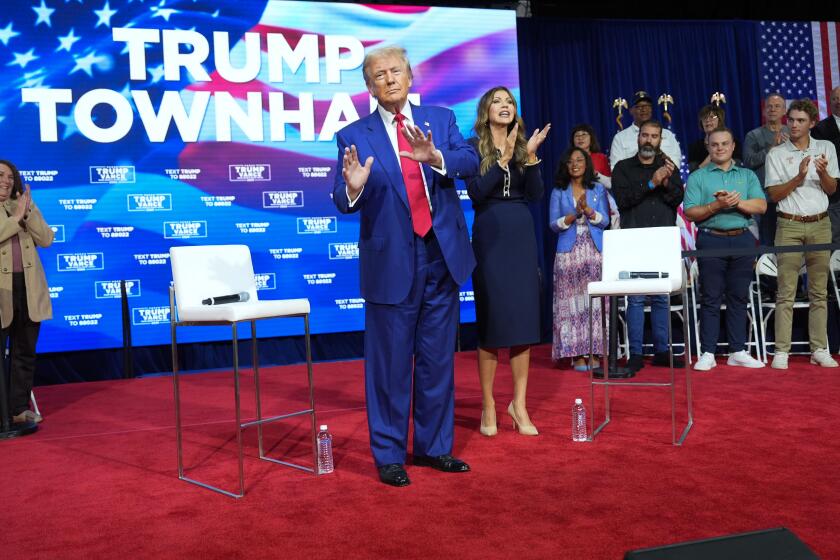Voters Tell GOP Moderates They Share Doubts on Agenda
Few political leaders have flown higher in so brief a time than House Speaker Newt Gingrich and his cadre of Republicans in their first 100 days on Capitol Hill. But if what’s happening to Rep. Michael N. Castle (R-Del.) in town meetings and school visits in his home state is an indication, Gingrich’s closed-ranks run through the early phase of the “contract with America” may have been a once-in-a-lifetime experience.
Castle is one of 30 or 40 Republican moderates who hold the balance of power in the House, where the GOP dominates by only a 25-vote margin. And while he went along with almost everything in the 10-point conservative wish list, his heart wasn’t always in it. He has had his doubts about GOP tax cuts for instance, and worries a bit about Republican plans for welfare reform. And now, in meetings with constituents from the state’s urban center in Wilmington to the rural areas around Milford, the feedback is fueling some of his uneasiness.
While the voters who have turned out to meet with Castle seem supportive of the general direction the Republicans have taken, many have offered caveats that mirror some of his own reservations about what the House has done. When one woman at a town hall meeting in Newark rose to complain about Republican tax-cutting plans in this era of big federal budget deficits, he replied: “Your lack of ease with all this is well-founded.” After another constituent later complained about proposed welfare changes, he said: “There are legitimate concerns out there.” And he acknowledged that his votes for the contract involved “a lot of close calls.”
Castle’s experience at home has its echoes around the country, in the districts of other moderates who have left the frenetic pace of Washington behind to spend time with the voters who sent them there. “The general reaction is: ‘You’re doing good things--I hope they are going to work,’ ” said Rep. Marge Roukema (R-N.J.). “They are kind of keeping their fingers crossed.”
*
While it’s too early to know for certain how they will react when they return, the feedback may make the GOP moderates less likely to put aside their reservations and toe the party line when the House reconvenes in early May. And that will make it much harder for the conservative majority to continue muscling its agenda through the House, especially when attention turns to more divisive issues such as abortion, gun control and the tough decisions about where to cut the budget.
“The pressure was much greater within the caucus to vote with the party” during the first 100 days, Castle said as he drove around his district, which encompasses the entire tiny state. “We’ll become more open to people voting different ways now that the contract is ended.”
Castle’s home state gets little national attention because of its size, but Delaware is something of a bellwether for broader political trends. In each of the last 11 presidential elections, Delaware has voted for the winning candidate--often by margins that came within a few points of the national breakdown.
The state does not have a clear partisan loyalty. It now has a U.S. senator from both parties, a Republican House member and a Democratic governor. Each party controls one chamber of the Legislature. That ticket-splitting environment tends to reward and nurture moderate politicians such as Castle, who was governor of the state from 1985 to 1993.
That hybrid political culture helps explain why Castle received a wide range of responses from constituents during a daylong swing through the state that took him from the urban, more liberal northern region, down to the capital of Dover and then into the more conservative, rural, southern part of the state.
*
At the town meeting in Newark, the third-largest city, a woman criticized Castle for voting for a regulatory reform bill that she said would gut environmental protections. A Democrat lashed out at the GOP contract and its push for tax cuts and a balanced federal budget.
“This is a contract with some of America,” said Peter Wells, a Newark minister. “An awful lot of that budget is going to be balanced on the backs of those who can afford it least.”
But by the time Castle had worked his way south through the state’s farmlands to a radio station in Milford, the political climate was more hospitable to the GOP agenda. A.J. Jackson, a conservative radio host, called Gingrich “awesome” and praised Republicans for keeping their 1994 campaign promise by bringing all the elements of the contract to a House vote inside of 100 days. Welcoming Castle to his show, Jackson said: “I want to thank you for keeping your promise.”
Others were more cautious in assessing what the Republicans had accomplished. Margaret Rose Henry, a Democrat-turned-Republican who is the only black member of the state Senate, welcomed the new emphasis on fiscal restraint, but said the GOP welfare plan went too far in shifting responsibility from the federal government to the states.
“There is a fear among some people that the states won’t behave responsibly,” Henry said in an interview.
Some liked the Republican policies but were unsure about Gingrich. “He doesn’t seem sincere,” said Jean Phillips, a Republican who volunteers at the Newark Senior Center.
Carol Reid, a Newark Republican at Castle’s town hall meeting, gave Gingrich and the GOP credit for transforming the political climate of the budget debate, but complained that other GOP policies would make it harder to balance the budget.
“I credit the Republicans and Newt Gingrich for bringing us that climate,” she said. “But I’m concerned about Republicans going for more defense spending and tax cuts.”
That, in fact, was a great concern to Castle as well. Before the tax-cut bill came before the House in March, Castle helped lead an effort to make the tax cut contingent on adoption of a plan to balance the budget and to scale back the benefits to wealthier families. GOP leaders made concessions to those concerns but far fewer than some had hoped.
It was enough for Castle to vote for the bill and send it to the Senate. But he acknowledged in an interview that he might not have voted for it--or the welfare bill, for that matter--if there had been no prospect for changing them in the Senate. “If those were final votes, I’m not sure I would vote for them,” he said.
*
He is not alone among moderates in feeling ambivalence about the course the House has taken this year. Rep. Sherwood Boehlert (R-N.Y.) voted for the tax bill, but said he might not do so again if the Senate doesn’t make a tighter link to deficit reduction and impose more restrictions on who gets the family tax credits. Rep. Constance A. Morella (R-Md.) voted for the House’s regulatory reform package but might not again if the Senate does not ease its risk-assessment requirements.
Rep. Jim Greenwood (R-Pa.) supported the welfare bill, but was so anxious about all the flak the GOP has caught for proposing to put school lunch subsidies into a block grant that he went out of his way to raise the issue when he bought lunch tickets for his daughters at their school.
“You need to know we didn’t cut school lunches,” he told the cafeteria worker, but she waved him off. “You don’t have to tell me,” she told Greenwood. “I watch Rush Limbaugh.”
Other Republicans were not so lucky. Castle got chewed out by the nutritionist at a local elementary school after a visit where he was given a hero’s welcome for helping restore money for a federal drug-prevention program. Boehlert got an earful too. “We are getting clobbered by people who believe we are trying to decimate the school lunch program,” he said. Federal school lunch spending would rise under the House Republican plan, but the program would no longer be a federal entitlement, thus limiting its long-term growth unless states spend more themselves.
Boehlert received support from his constituents for his opposition to Republican regulatory reform policies, which he said would undercut environmental protections that are popular in his Upstate New York district near the Adirondack Mountain lakes that made acid rain famous. He is going back to Washington more determined than ever to fight conservative Republicans’ efforts to weaken environmental standards when the House in May turns to such measures as the Clean Water Act and the Endangered Species Act.
“We have got to begin to focus on some of these issues and show the American people we are not just naysayers,” he said. “We’ve got to do something about softening the party’s image.”
*
The environment is just one of many upcoming issues where moderates are likely to break away from their party’s conservative majority. Many, including Castle, support abortion rights and last year’s ban on assault weapons. The contract with America was drafted expressly to exclude such divisive issues, and focus instead on economic issues about which there was broader party consensus.
But there is no comparable consensus among Republicans going into the debate that will dominate the coming months: How to cut spending as much as it takes to balance the budget by the year 2002. With less pressure on them to maintain party unity than there was during the first 100 days, many moderate Republicans are girding for an intraparty battle over GOP budget priorities.
More to Read
Get the L.A. Times Politics newsletter
Deeply reported insights into legislation, politics and policy from Sacramento, Washington and beyond. In your inbox three times per week.
You may occasionally receive promotional content from the Los Angeles Times.











